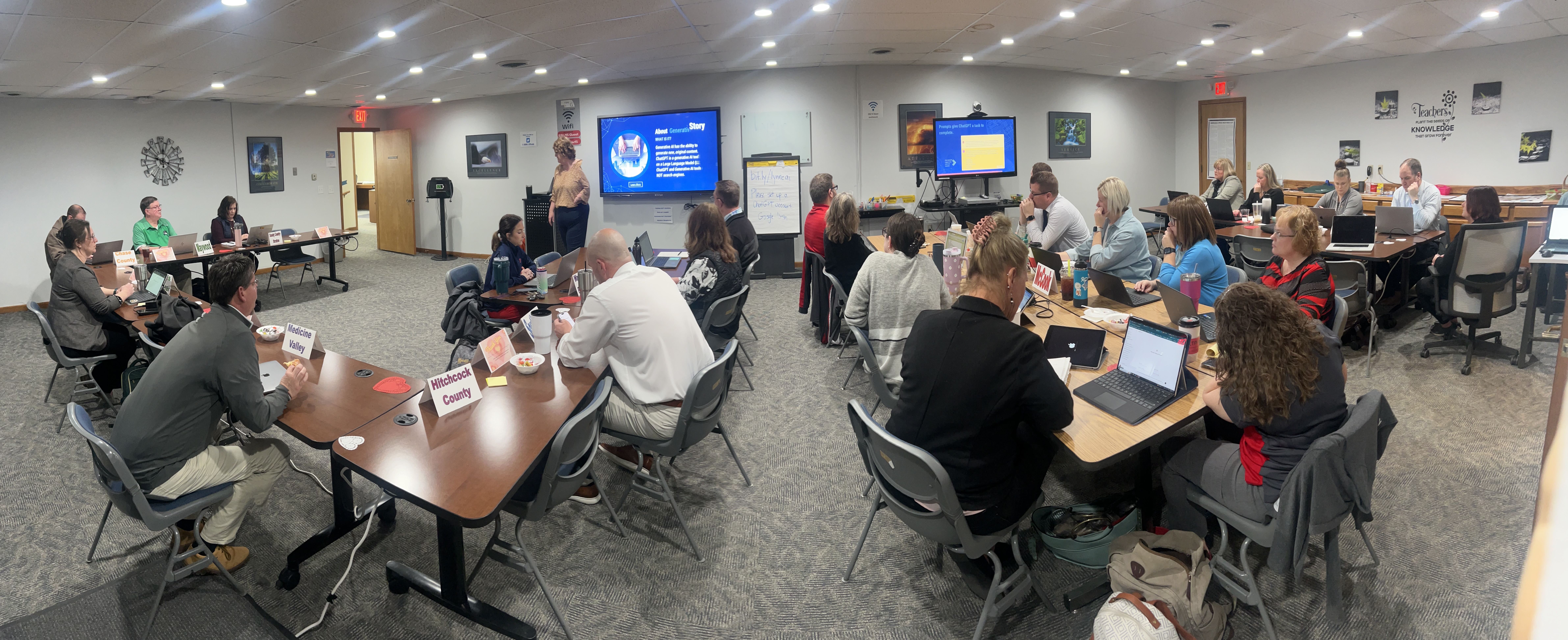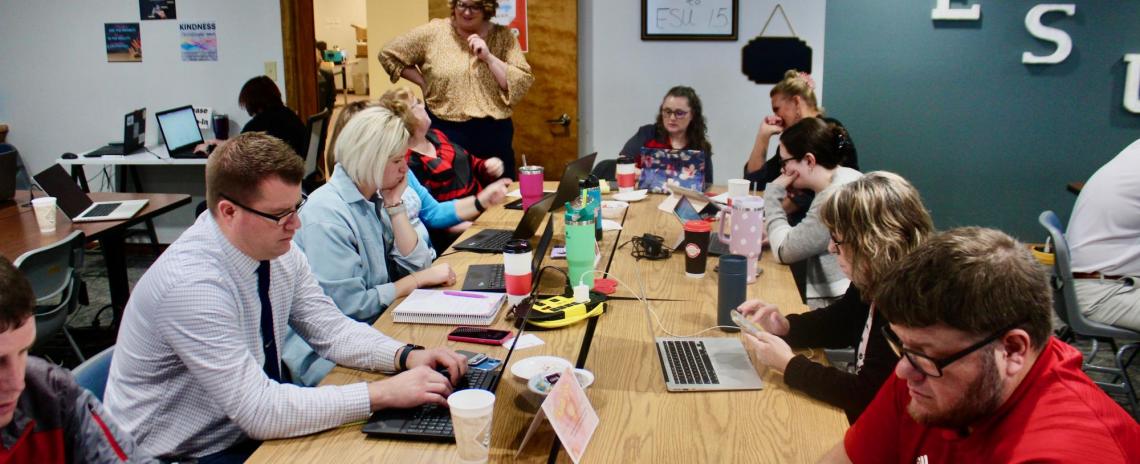Head First Into the Future: Educators, administrators dive into Artificial Intelligence at ESU 15 workshop
Head First Into the Future: Educators, administrators dive into Artificial Intelligence at ESU 15 workshop
By Tyler Dahlgren
Artificial Intelligence is no longer on the way. It’s here, there, everywhere, and it’s ready to be explored.
Dr. Lynne Herr has had this feeling before.
It was near the turn of the century. Herr was relatively new to her school technology director position at School District 145 in Waverly when she attended a session at the University of Nebraska-Lincoln, where organizers were set to debut something called “Mozilla”, now known as Firefox.
The internet, at the time, was largely text-only, and, with no search engines, its infinite capacities still very much a mystery.
“We came in, sat down and waited,” Herr remembers. “It came through one line at a time, very slowly. They’d search for an image, and pixels would appear. We were in awe.”
The engine froze halfway through, but that didn’t matter.
“The room I was in, we just all instantly realized we were seeing something that was going to be a game changer in what we do,” she said.
Dr. Herr and her colleagues couldn’t have been more spot on all those years ago. Flash forward to 2024, and they’re undoubtedly on the brink of another gamechanger.
It was just before the holiday break in 2022 when a social media post from a national ed tech colleague caught the attention of Herr, who since 2007 has served as ESU 6’s Technology Professional Development Consultant.
“I just used ChatGPT to plan a conference on ChatGTP,” the post read.
Those words in that sequence meant nothing to Dr. Herr, but she had a strange feeling they soon would. She was intrigued, and signed up for the conference not fully knowing what to expect. The trip was worth it.
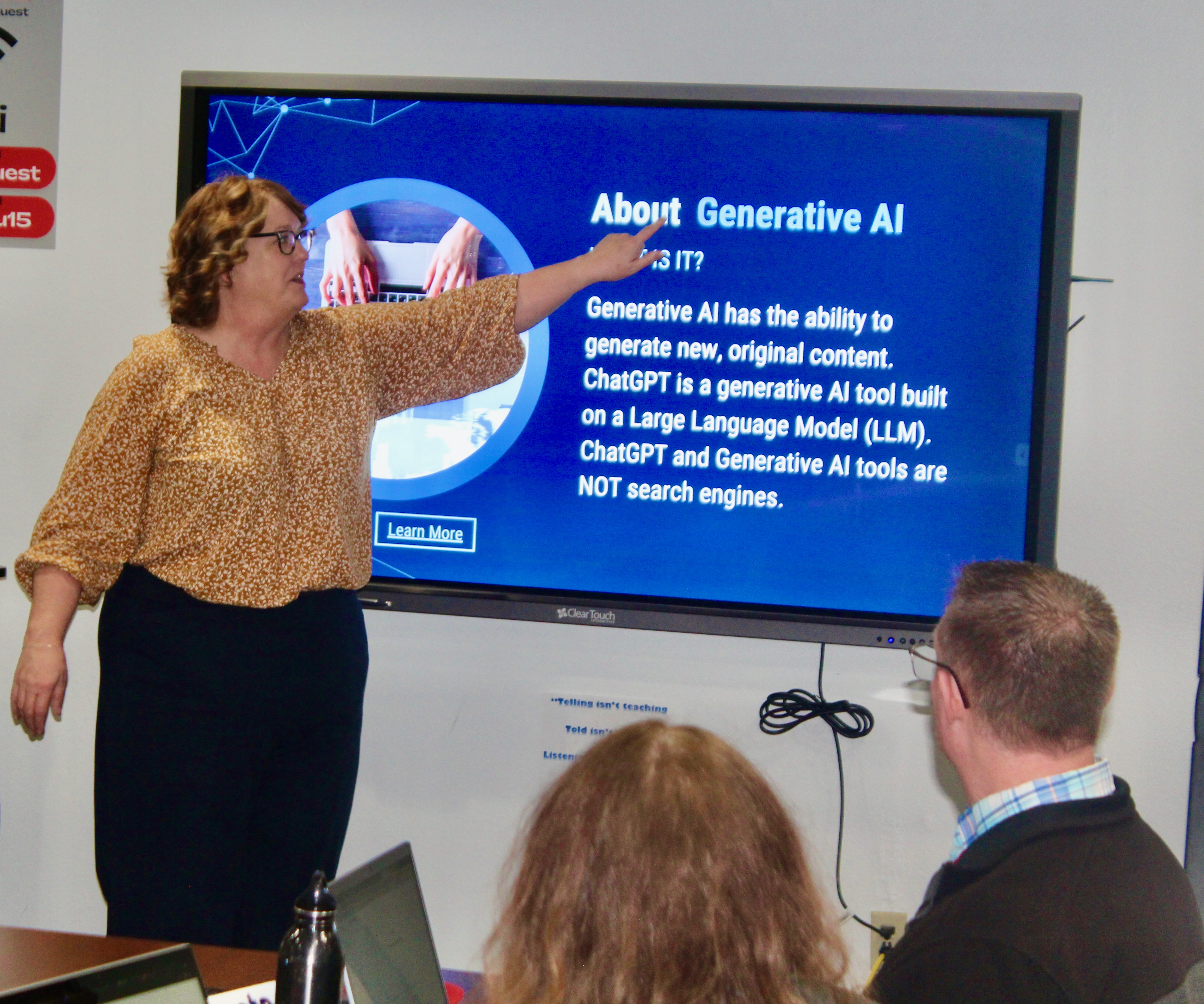
“Within a few days of getting back I had organized colleagues from around the country and we collaborated to build a resource hub for educators to help them understand: What are these tools? What are the potential impacts for student work? What are the impacts for educator work?” Herr explained. “Since December of 2022, this has been a major focus of my work, and I’ve been doing it all over the place. It seems that once people hear about it and understand it, the demand continues to grow for getting that information to every educator and every administrator that we can.”
Count ESU 15 administrator Phillip Picquet in that camp. Picquet was the middle school principal in Waverly while Herr was tech director. They’d known each other for over 15 years when he listened to one of Herr’s presentations at an ESU Professional Development Organization (PDO) and knew he needed to get his former colleague out to ESU 15 in Trenton.
“This is going to change not only education, but the world we live in,” Picquet remembers thinking. “Lynn really opened my eyes to how AI can really be utilized, and the big thing for me was making sure our teachers know how to utilize it in their classrooms, and that we’re introducing this to students in a positive way.”
Dr. Herr happily accepted Picquet and ESU 15 Professional Development Director Angie Dickey’s invitation, and ventured west to present to superintendents and educators during a day-long workshop on Feb. 20. The workshop was as interactive as it was informative.
“For the people that attended, it really opened their eyes,” said Picquet, who also had his staff participate in the workshop. “I know that schools are already implementing some of the things that she demonstrated to them, and it has made them start to think, ‘How are we going to teach kids to utilize this tool, and how are we going to put the guardrails and the guidelines in our lesson plans and our own instruction?’”
McCook Public Schools Technology Director Tina Williams had collaborated and learned from Dr. Herr before, and was thrilled to be joined at the workshop by a table full of educators from her district.
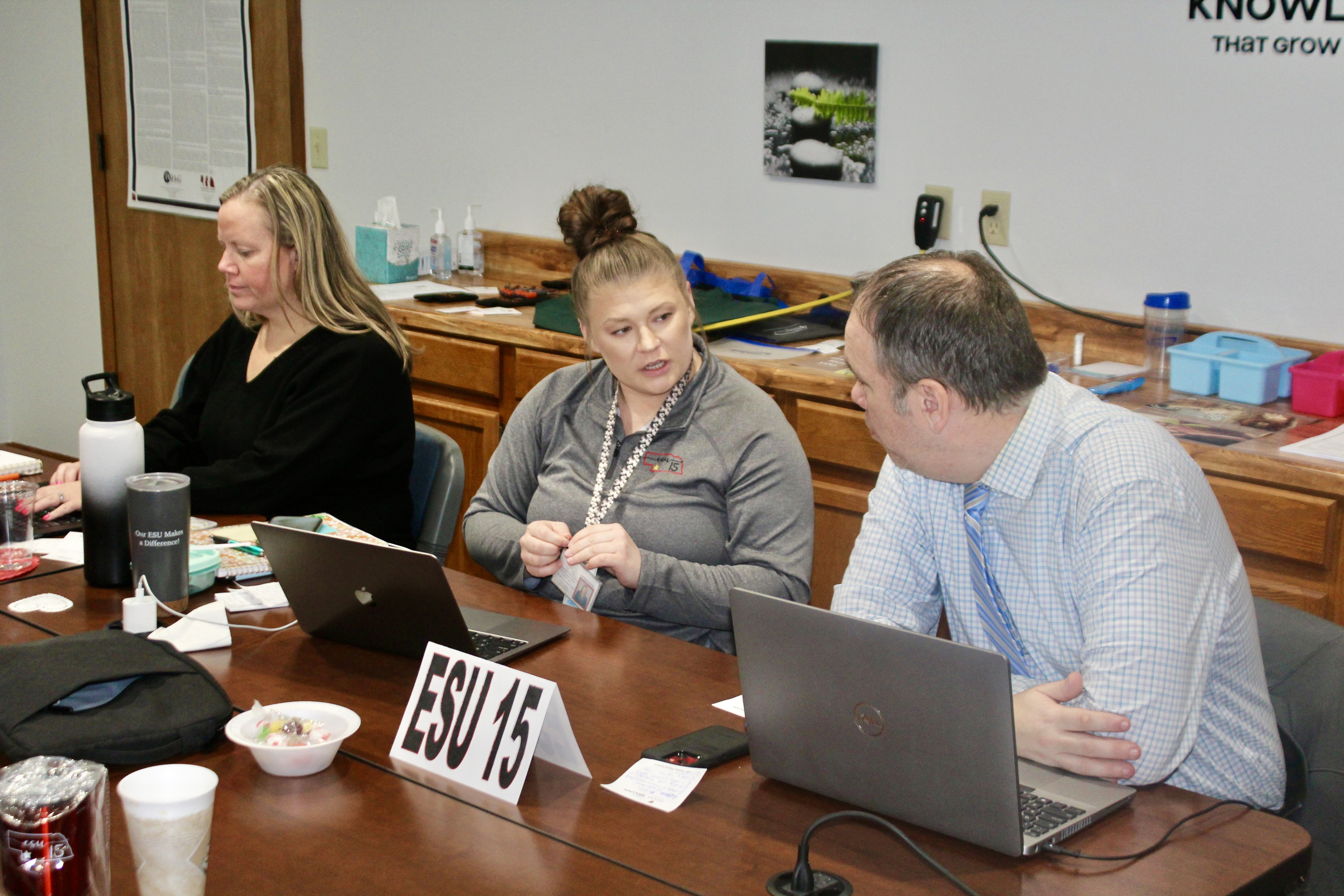
“In my job, I really want to support my staff, so to get a better idea of what needs they have on a daily basis that can be met by AI, that’s what I was hoping to take away from the experience,” she said. “And to reduce some of their fears and their ideas about it being more harmful than good and that type of thing. Just to see them working and getting excited about these new tools to learn about, that was fun too.”
From the start of her exploration into AI, that’s been one of Herr’s major goals. Bringing AI into focus. One of the things Picquet appreciated about her presentation was its rationality. AI comes with a lot of good, but it’s not perfect. In fact, it has the potential to be extremely disruptive when not utilized properly, Herr explained.
“Even inside of our education lens,” she continued. “If we don’t understand these tools, I think we will see the decreasing relevance of education over time, especially if we don’t change and adapt to address education in a world where these tools exist.”
Picquet was on that same wavelength when he called Dr. Herr with the invitation. Students are going to be introduced to AI no matter what, he thought. It’s up to schools to decide whether to be there guiding them along the way. In education, it’s always better to be proactive.
“Our students need to know this,” Picquet said, “because it’s going to change the world we live in, and we can either adapt to it and use these powers for good, or be reactionary and be left behind.”
Dr. Herr’s philosophy has always been task first, tool second. She opened the workshop by asking everyone to identify daily work tasks that demand time, energy and a computer screen. Reporting, writing and responding to emails, policy analysis, grading feedback, letters of recommendation, these are all time-consuming tasks, albeit important ones. When utilized properly, ChatGPT and similar AI tools can save precious time without forfeiting any quality whatsoever.
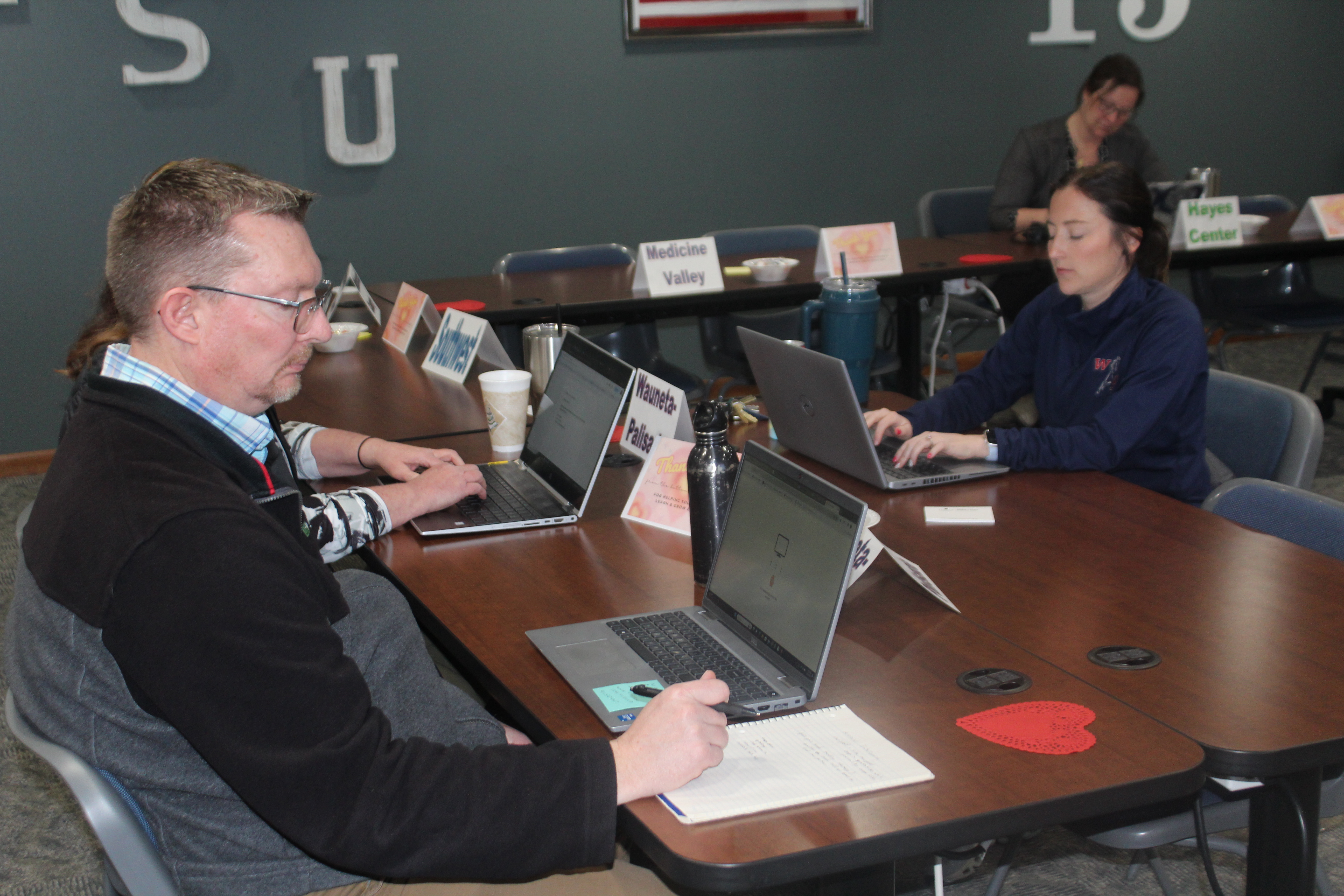
“In my nearly 30 years in education, I have not seen tools with this much potential to keep educators in the field, including administrators, by taking off some of the daily grind of the workload that happens in front of a computer,” Herr said. “It doesn’t change everything, but it can really help make those processes more efficient. Working specifically with educators, whose jobs get harder all the time, my goal is for them to leave the session feeling like something just got easier for them.”
Williams said AI’s emergence has the potential to lead to one of the largest paradigm shifts we’ve ever seen in education, and it’s better to be ahead of the curve.
“Education’s about our students and their world is going to look entirely different than the one we’ve grown up in and even the one we’ve been adults in,” said Williams. “It’s our job and our duty to really prepare them for the future, to be able to protect themselves, to be thinkers and to be able to succeed.”
Picquet hopes this won’t be the only workshop. He plans to bring back Dr. Herr, who he called “dynamic, super intelligent, and practical with a passion for education”, in the future.
“Dr. Herr is essential to this work, and we are very, very fortunate to have her in our state,” said Williams. “She’s a leader around the world, and has a gift for bringing complicated things to us in a very digestible and usable way. Her desire truly is to help us do what’s best for kids. And Angie (Dickey) is doing a fabulous job in our area pulling in schools and facilitating collaboration around this. That's been a huge benefit.”
Herr hopes those that took part in the workshop left with a greater understanding and a lessened amount of fear of AI.
“When we’re afraid of something, we don’t learn about it,” she said. “We just push it all away, and that’s not helpful in this situation. I don’t consider this a magic tool. These tools require even greater analytical skills, content knowledge and life experience to produce better results than we do when we’re trying to do things in a hurried way ourselves.”
This is only the tip of the iceberg, Herr said. There’s more coming.
“I feel really passionately about educating everyone that I can so that they understand both the pros and the cons,” Herr said. “And in my world, I’ve always felt like anything positive we can harness from technology, we’re obligated to do so.”
She thinks back to that session at UNL, to all those people marveling over all those grainy pixels.
Yep, Dr. Lynne Herr has had this feeling before.
